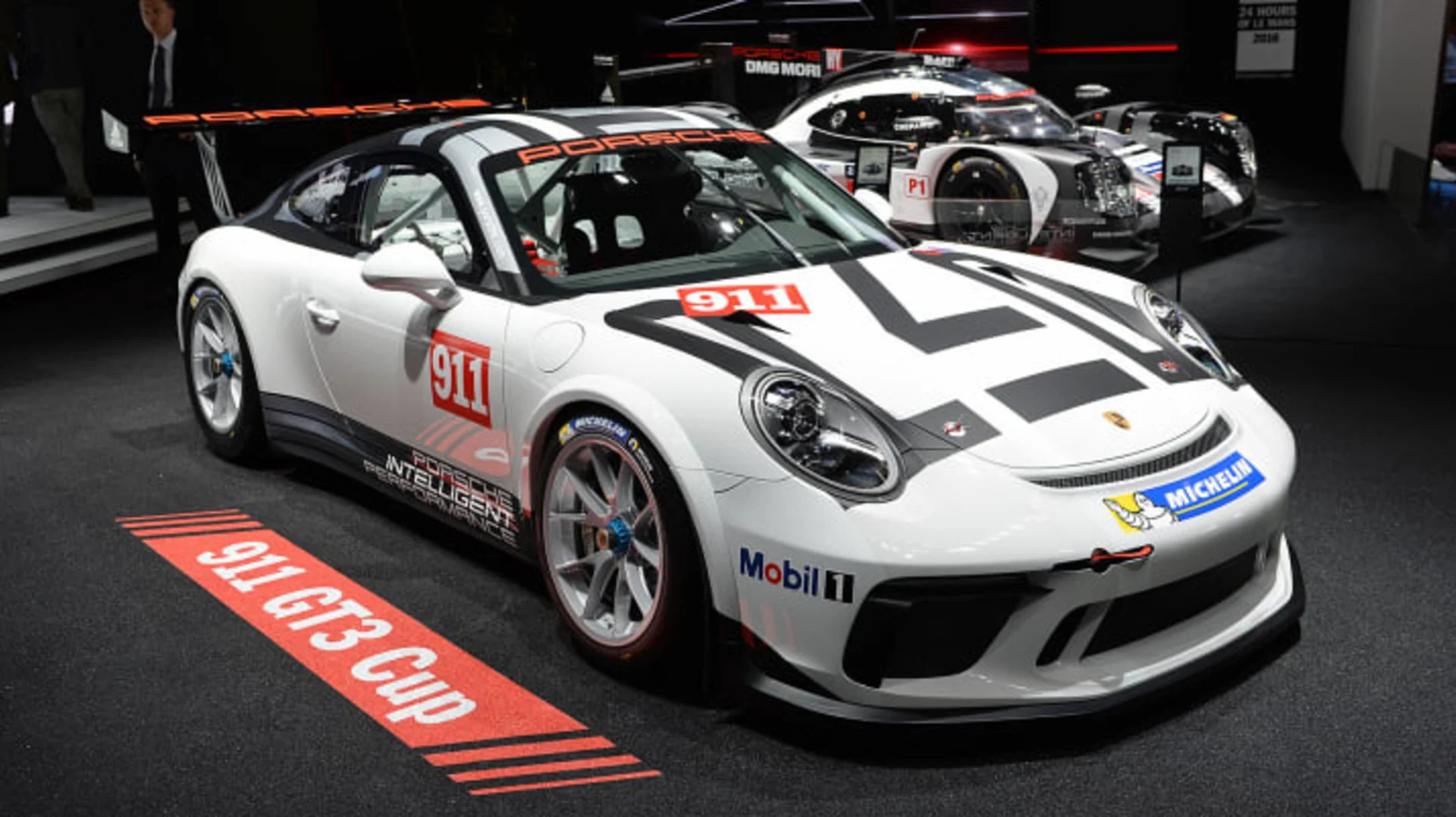Not even Porsche is immune to global automotive trends. You may have heard the old saw that Porsche sells more SUVs than cars now. (It does, by a lot.) On top of that, the base Carrera now uses a turbochargers, there are hybrids across the lineup, and an electric car is on the way. In light of all this stands the GT3, the definitive counter-argument to forced induction.
The reason the GT3 hasn't gone the turbo is the same reason the GT3 exists: because racecar. In an interview with Autoblog, GT Project Director Andreas Preuninger laid it out thusly: "What's very crucial for us, a key factor is the bloodline between the racecar and the street car."
That's not just marketing. Preuninger tells that, without the 997-generation GT3 R racecar, there never would have been a GT3 RS 4.0 road car. "The theoretical paperwork didn't show how good the engine felt and what you could do with it before you really built one and tried it. That's what you do on the racing side - just try something out. And that filters into the street cars as well."

Yes, all of the rhetoric 911 owners spout off (whether you ask or not) about Porsche building racecars for the street is true. But not in the sense that you might think. The symbiosis goes both ways, and disproportionately from the street to the track. Preuninger explains, "The endurance testing on the street car is way beyond anything we do to a racecar ... The sheer amount of development cars that we have on the GT3 project is so much more than what we have on the Cup car. So the Cup car is really - and the R as well - benefiting from this system where we have a broad development phase where we can sort our problems.
"Every race engine has its overhaul scheduled every 30 hours - tear it apart. On the street engine, it has to last for a lifetime, which is like maybe 300,000 kilometers [186,411 miles]. So that a complete different approach," he says. And when a part is needed on the racecar the engineers know it's made to withstand those lifetime stresses, which are usually more that the short-period, higher-stress duty cycle in racing.
Of course, the relationship goes both ways. When Porsche adapts a road part for racing, Preuninger says "We take it back to the street car, because we need it for homologation reasons." And yes (again), the GT3 is really a race-bred street car, to the point where "The so-and-so number of cars on the street [needed for homologation] is mostly the GT3 [production] run, or RS run, depending."

So, street-to-track lineage firmly established, where does that leave the GT3 in the face of our government-mandated downsized and electrified future? Exactly where it is now, at least for the time being. "It wouldn't make sense to make a GT3 Turbo when you have a GT3 R or a Cup car that's atmospheric for some legislation for FIA or ALMS. They're brothers, definitely, they're the same breed. If we decide to go the atmospheric route in racing, it's definitely clear that we follow the same route on the GT street cars as well."
So yes, in the future we could see a Porsche 911 GT3 that abandons the high-revving, naturally-aspirated lineage. Or if history is kind, the GT3 name will be retired when the race car engine rules mandate changes. In the meantime, the GT3 remains as the most desirable production Porsche. Most of that has to do with the 500-horsepower jewel sitting over the rear axle. Racing improves the breed, as the saying goes. Let's hope that racing preserves the breed as well.
Related Video:
The reason the GT3 hasn't gone the turbo is the same reason the GT3 exists: because racecar. In an interview with Autoblog, GT Project Director Andreas Preuninger laid it out thusly: "What's very crucial for us, a key factor is the bloodline between the racecar and the street car."
That's not just marketing. Preuninger tells that, without the 997-generation GT3 R racecar, there never would have been a GT3 RS 4.0 road car. "The theoretical paperwork didn't show how good the engine felt and what you could do with it before you really built one and tried it. That's what you do on the racing side - just try something out. And that filters into the street cars as well."

Yes, all of the rhetoric 911 owners spout off (whether you ask or not) about Porsche building racecars for the street is true. But not in the sense that you might think. The symbiosis goes both ways, and disproportionately from the street to the track. Preuninger explains, "The endurance testing on the street car is way beyond anything we do to a racecar ... The sheer amount of development cars that we have on the GT3 project is so much more than what we have on the Cup car. So the Cup car is really - and the R as well - benefiting from this system where we have a broad development phase where we can sort our problems.
"Every race engine has its overhaul scheduled every 30 hours - tear it apart. On the street engine, it has to last for a lifetime, which is like maybe 300,000 kilometers [186,411 miles]. So that a complete different approach," he says. And when a part is needed on the racecar the engineers know it's made to withstand those lifetime stresses, which are usually more that the short-period, higher-stress duty cycle in racing.
Of course, the relationship goes both ways. When Porsche adapts a road part for racing, Preuninger says "We take it back to the street car, because we need it for homologation reasons." And yes (again), the GT3 is really a race-bred street car, to the point where "The so-and-so number of cars on the street [needed for homologation] is mostly the GT3 [production] run, or RS run, depending."

So, street-to-track lineage firmly established, where does that leave the GT3 in the face of our government-mandated downsized and electrified future? Exactly where it is now, at least for the time being. "It wouldn't make sense to make a GT3 Turbo when you have a GT3 R or a Cup car that's atmospheric for some legislation for FIA or ALMS. They're brothers, definitely, they're the same breed. If we decide to go the atmospheric route in racing, it's definitely clear that we follow the same route on the GT street cars as well."
So yes, in the future we could see a Porsche 911 GT3 that abandons the high-revving, naturally-aspirated lineage. Or if history is kind, the GT3 name will be retired when the race car engine rules mandate changes. In the meantime, the GT3 remains as the most desirable production Porsche. Most of that has to do with the 500-horsepower jewel sitting over the rear axle. Racing improves the breed, as the saying goes. Let's hope that racing preserves the breed as well.
Related Video:










Sign in to post
Please sign in to leave a comment.
Continue